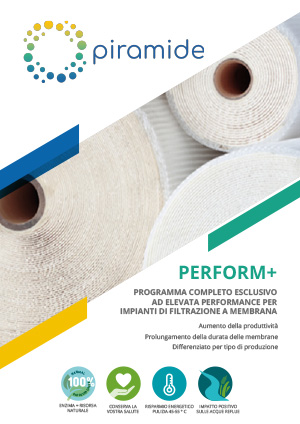FILZYM range for membrane filter cleaning. A unique, complete range with high specificity!
POP complete 3-stage high performance programme!
FILZYM range
The uses of membrane filtration plants in the food industry are increasingly numerous.
Energy saving, efficiency, technical benefits, food safety, there are countless advantages that have defined the success of this type of plant.
For any type of filtration, from microfiltration to reverse osmosis, for a membrane filtration plant, regeneration is a CRUCIAL MOMENT.
PIRAMIDE has been applying the FILZYM range for over twenty years, and, alongside REALCO, has been developing new applications and formulations relating to the membrane filtration process.
From this experience comes global expertise in membrane filtration processes!
Membrane filtration: our goals
Reduced cleaning time
Increasing production
Prolonging the life of membranes
Reducing water consumption
Our technicians are at your disposal to further discuss membrane filtration systems!
Our technicians are at your disposal to further discuss membrane filtration systems!
Membrane filtration
Performance Optimisation Programme (POP) Comprehensive 3-stage high performance programme!
Membrane filtration requires special attention due to the complexity of the process and the high cost of membranes.
Loss of efficiency can occur quickly as a result of fouling, causing a decrease in filtration performance.
In addition, extraordinary intensive washing with corrosive detergents can damage membranes and reduce their lifetime.
How do we increase plant productivity?
A precise programme and the use of suitable cleaning solutions can increase yield and productivity.
The Performance Optimisation Programme is a comprehensive, unique, high-yield programme specific to each type of industrial production that can increase productivity and extend the life of membranes.
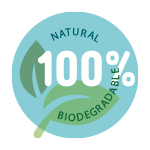
IS A RESOURCE NATURAL

PRESERVING YOUR HEALTH

HAS A POSITIVE IMPACT ON WASTEWATER

ENERGY SAVING CLEANING 45-55 °C
Complete 3-stage programme
Our experts carry out a field audit to determine the type of fouling of your filtration units.
This is carried out with non-aggressive technical solutions for the membranes and the system.
The Performance Optimisation Programme takes place in 3 subsequent stages.
1. Fouling identification
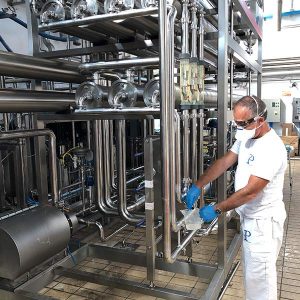
Identifies the nature of residues that could reduce the efficiency of the systems:
- Organic contamination: proteins, fats, starches, etc.
- Inorganic acid-recalcitrant residues
- Biofilm detection
Shows, detects and quantifies contamination by:
- Detecting the presence of biofilmogenic bacteria (SLYM BART)
- Microbiological analysis
- Measurement of ATP concentrations
- Determines the cleaning protocol to be applied
Thanks to the Fouling Identification procedure, it is also possible to assess the presence of biofilms in implants.
2. Formulation selection and protocol proposal
Based on the results of the audit, we select from our solutions the most suitable procedure for the type of fouling found.
A complete protocol will be drawn up, with high-performance enzyme formulations chosen from the 3 types.
3. Protocol application and monitoring
Because we see optimisation as a process of continuous improvement, our technicians will support you on a daily basis to evaluate your performance.
PERFORM+®
Enzymatic detergency increases the performance of membrane filtration plants:
- PERFORM+®
- PERFORM+® is a complete, unique and high-yield programme specific to each type of industrial production that increases productivity and prolongs membrane life.
How do we increase plant productivity?
- With a two-stage programme:1st stage: the Fouling Analysis Kit (patented technology): provides timely diagnostics of membrane filtration installations
- 2nd phase: indication of the method and enzymatic cleaning solution suited to the complexity of the plant
3 Kits specific to type of production
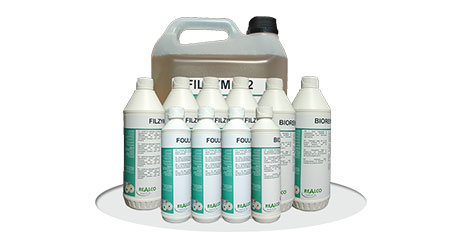
Milk Kit
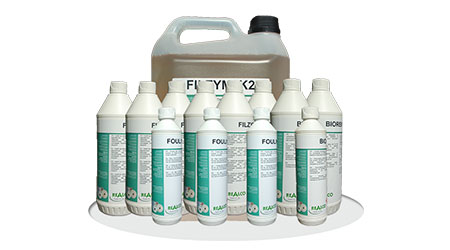
Protein Concentration Kit
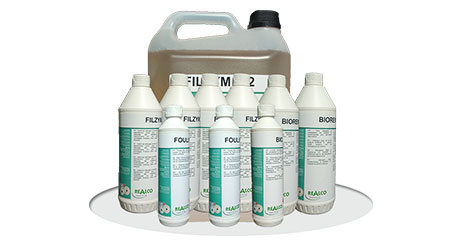
Cereals, legumes and fruits kit
Membrane Regeneration Service
Regeneration of membrane filtration plants: a complex topic
The cleaning of membrane filtration plants requires a high level of expertise due to the complexity of fouling and the high cost of membranes.
Loss of permeability can quickly cause significant productivity losses, making regeneration even more difficult.
In addition, corrosive products normally used for overflushing can degrade membranes and shorten their service life.
High value-added services
Realco-Pyramide’s enzymatic range of more than 20 specific formulations, together with targeted extraordinary regeneration, can restore the original permeability.
What are Membrane Filters for Food Grade Detergents
Membrane filters for detergents in the food industry are essential devices used to purify and filter liquids and solutions during production processes.
Here are the main features and advantages of membrane filtration:
Function and features
Membrane filters use semi-permeable membranes with microscopic pores to separate particles and contaminants from liquids.
There are different types of membrane filtration, including:
- Microfiltration (MF): removes particles from 0.01 to 10 μm
- Ultrafiltration (UF): removes particles down to 0.01 μm, including viruses
- Nanofiltration (NF): removes bivalent ions and particles down to 0.001 μm
- Reverse osmosis (RO): removes almost all contaminants, with pores down to 0.0001 μm
Benefits in the food industry
The use of membrane filters offers several benefits:
- Improved quality and purity of end products
- Increased food safety by removing contaminants and microorganisms
- Effectiveness in removing impurities without altering organoleptic properties
- Reduced disposal costs due to the absence of filtration residues
- Possibility of recovering and reusing valuable components from the filtration process
Main applications
Membrane filters are used in various sectors of the food industry:
- Filtration of beverages such as wine, beer, juices
- Treatment of edible oils
- Purification of process water
- Separation and concentration of components in the dairy industry
Maintenance and regeneration
To maintain the efficiency of membrane filters, proper cleaning and maintenance is essential:
- Use of specific cleaning agents such as PROGRAMME POP to identify fouling and restore performance
- Use of acidic solutions to remove inorganic contaminants and fouling
- Use of alkaline detergents to remove organic residues such as grease and proteins
- Periodic fouling analysis and application of targeted cleaning programmes
Proper handling of membrane filters allows you to increase their service life, maintain high filtration efficiency and ensure the quality of the food products being processed.
Membrane Filtration Brochure
Increased productivity
Extended membrane life
Differentiated by type of production
